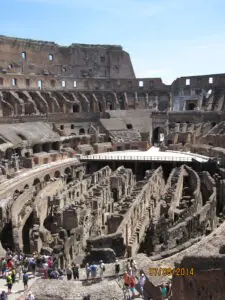When we think of a highly successful ancient army, then we usually either imagine the Spartan or the Roman army. But did these two armies ever face each other in battle? Did Sparta and Rome fight each other?
While Sparta had been a Roman ally during the First Macedonian War (214-205 BC) and was even named a Roman „socius“ (confederate) in the Treaty of Phoenice in 205 BC, Sparta switched sides in 197 BC. Between 197 and 146 BC, Sparta joined several wars against Rome. In 146 BC, when all of Greece was conquered by Rome, Sparta was given the status of a free city and became a tourist attraction for Rome`s elites.
Let`s take a closer look at the wars between Sparta and Rome. However, Sparta and Rome had not always been hostile towards each other.
The First Macedonian War: Sparta as a Roman Ally
For that, we have to look at the Macedonian Wars (214-148 BC), a series of conflicts in which Rome and its Greek allies fought against several different Greek kingdoms and city-states. For more on the Roman expansion into Greece (and the expansion that predates the Roman arrival in Greece), you might want to check out my article here.
Ok, so Rome was obviously a major player in the Macedonian Wars. But what was Sparta’s position during the Macedonian Wars? At the time of the Macedonian Wars Sparta had already lost all of its military might and political significance that it once had so its significance was limited.
In the First Macedonian War (214 – 205 BC) Sparta and the Aetolian League, Rome’s first Greek ally, fought alongside the Romans against the troops of Philip V of Macedon. And in the Treaty of Phoenice (205 BC), Sparta is explicitly named as a „socius“ (confederate) of Rome.
It was in this war that the Roman Legion proved superior to the Macedonian phalanx. However, the Treaty of Phoenice did not solve the problems that had caused the Macedonian Wars. More on the cause of the First Macedonian War here.
But after the Treaty of Phoenice in 205 BC Sparta, which had previously fought alongside Rome against the Macedonian king, switched sides.
197 – 146 BC: Wars Between Sparta and Rome
As mentioned, the Treaty of Phoenice in 205 BC did not solve the problems that had caused the First Macedonian War in the first place. So soon another war, the Second Macedonian War, started.
In 197 BC, during the Second Macedonian War (200-196 BC), the Spartan king Nabis allied himself with Philip V of Macedon against Rome since Philip V had promised Sparta the city-state of Argos (Spartas eternal enemy) in return for an alliance.
Speaking of Greek city-states. Have you ever wondered how large Greek city-states like Sparta, Athens and Argos were and how many people lived in such a city-state? Then I would like to recommend you my article here.
However, as soon as Sparta had occupied Argos, the Spartan king Nabis ended his alliance with Philip V of Macedon and offered his forces to the Roman general Titus Quinctius Flaminius (here more on how Roman names worked and why they could get so long).
After the Second Macedonian War, the Spartan occupation of Argos contradicted the official Roman policy of freedom to the Greeks. So the Roman general Titus Quinctius Flaminius ordered the Spartan king Nabis to withdraw from the city-state of Argos, something Nabis refused.
In the spring of 195 BC a Greek assembly that was convened by Flaminius decided on a war against Sparta with the blessing of the Roman senate. Soon after, a combined army of Greeks and Romans marched into Laconia (Spartan territory) and Nabis was forced to agree to Rome`s conditions. Sparta was no longer allowed to wage war or enter alliances and had to give up Argos, its Perioikoi cities, and most of its navy. However, Nabis was allowed to remain king of Sparta.
Losing the Perioikoi cities was a harsh blow since the number of Spartiates was extremely low (LINK zu downfall of sparta) and the Perioikoi were essential for the Spartan armies. And losing most of the Spartan fleet was just as bad!
However, even that didn`t stop Nabis from once again joining a war against Rome.
In the Syrian War (192-189 BC) Sparta and its king Nabis together with the Aetolinan League, now an enemy of Rome, joined the war on the side of Rome’s enemies. However, Nabis was seen as unreliable and was assassinated by his allies in 192 BC.
In the following years, Sparta and the Achaean League wore each other’s forces down in a string of conflicts, a circumstance that Rome used in 146 BC.
In 146 BC, Rome used the fact that Sparta and the Achaean League had grinded each other’s forces down and subdued all of Greece after it had shattered the Achaean League. Sparta was not directly conquered by Rome in 146 BC but was given the status of a Free City and didn`t have to pay any dues aside from friendship services (at least in theory). But despite its status as a free city, Sparta soon turned into a tourist attraction for wealthy Romans.
And even when Emperor Augustus organized Greece into the province of Achaea in 27 BC, Sparta (and Athens) kept their status as free cities and did not become a part of the Roman province of Achaea. Sparta would keep its status as a free city well into the 3rd century AD.
However, that freedom only existed on paper. In reality, all of Sparta’s political and military power was long gone.
But as mentioned, the status as a free city didn`t prevent Sparta from becoming a tourist attraction for wealthy Roman tourists after 146 BC. Athletic and musical competitions and traditional ceremonies (that were quite exotic for the Romans) were held as tourist attractions and Sparta even built large tribunes to optimize the enjoyment of the tourists.
Now I guess you might be a little surprised that a society that prided itself on its military values would perform musical competitions for tourists. However, there was a time in Spartan history when musical skills were held in just as high regard as martial skills. But that is a story for another time.
Take care of yourself because you deserve it. You really do.
Until next time
Yours truly
Luke Reitzer
Sources
Karl-Wilhelm Welweit: Sparta. Aufstieg und Niedergang einer antiken Großmacht (Stuttgart 2004).*
Disclaimer: This post contains affiliate links that are identifiable by the *. If you use these links to buy something we may earn a small commission without additional cost for you. Thanks.

